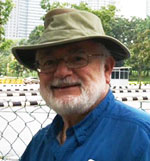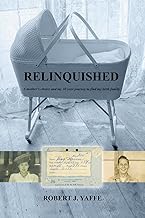Relinquished, A Mother’s Choice and My 30 Year Journey to Find My Birth Family by Robert J. Yaffe (Amazon, IngramSpark, 2023), Illustrated, 290 pages.
By Oliver B. Pollak

 RICHMOND, California — Disclosure: Your reviewer has known the author since the early 1980s and has written about his grandfather, Nathan Yaffe (1888-1971), who arrived in Omaha in 1906. Yaffe Printing had Yiddish and Hebrew type to serve Jewish clients. The bulk of this book was read on Mother’s Day.
RICHMOND, California — Disclosure: Your reviewer has known the author since the early 1980s and has written about his grandfather, Nathan Yaffe (1888-1971), who arrived in Omaha in 1906. Yaffe Printing had Yiddish and Hebrew type to serve Jewish clients. The bulk of this book was read on Mother’s Day.
This is an amazing well-written story of a persistent investigation of over 30 years in search of truth, identity, and family origins and legacy. Bob started writing the saga in 2020 and most appropriately dedicated this, his first book, “To my parents, Dorothy and Sol Yaffe and to my wife Rita.”
This memoir and autobiography is filled with secrets, doubts, anticipation, anxiety, temporary disappointments, regrets, the thrill of the chase and the exaltation of success. He repeatedly states the discoveries changed his life, and it also enriched the lives of the brothers and sisters he discovered.
Bob Yaffe attended the University of Nebraska-Lincoln and is a devoted Husker fan. He earned his law degree at Creighton University Law School. He served three years as a commissioned officer in the Army JAG Corps as a trial counsel. In civilian life he spent seven years as a deputy Douglas County prosecutor.
Yaffe had four obsessions, the law, being an engaged Jew, opera, and discovering his family. He was an active volunteer in the Omaha Jewish community, had a fine singing voice, and assisted at Omaha’s Beth El Synagogue. Feeling something was missing in his professional vocation he developed a second career as a Jewish community services professional. In Columbus, Toledo, Winnipeg, and Chicago he filled executive positions at Jewish Community Centers and Conservative synagogues.
Yaffe began his family roots exploration in 1985. The biggest hurdle was the Closed Adoption policy. He sought assistance of a rabbi, researched newspapers in the Omaha Public Library, hired investigators, and most successfully retained Kinsolving. More recently AncestryDNA and 23andMe has revolutionized family searches by efficiently exposing hitherto unimaginable family connections.
Pauline, Yaffe’s birth mother, born in 1928, was raised in an Orthodox Jewish family. She had two sons that she gave up for adoption in the 1940s. The stigma of birth out of wedlock and illegitimacy was far stronger at mid-century than today. She married Ken but had an affair and Yaffe was born in December 1949. To save her marriage Yaffe was relinquished and placed for adoption with the specification that the adoptive parents be Jewish. Yaffe’s birth father, Sam, did not know that Pauline had his child. Sam married in Colorado, started a family, and had two sons.
Around 2000 Yaffe was invited to address an Illinois legislative committee looking into the issue of open adoptions. He “declined out of respect and concern that my parents might hear of my search.” He regretted not participating in those hearings.
Pauline and her husband had a son and a daughter. Yaffe met with Pauline’s children clandestinely on Mother’s Day in Davenport, Iowa in 2002. A marvelous bonding occurred between the siblings and their spouses regardless of differences in religious faith and politics. The similarity of facial features from the biological parents transmitted to the siblings was apparent. They visited each other, went on vacations together, and kept in touch by phone. The pandemic temporarily reduced contact.
Pauline was invited to a Passover Seder with Yaffe and Rita in Chicago. It was her first seder in decades. Bob worried about the appearance of betraying trust and invading privacy. There were strains. The last thing Yaffe wanted was to hurt his parents. His deception evoked feelings of guilt and dishonesty. He tried to tell his parents about the new relationships. In 2006 he talked with his parents. “It did not go well. It is a difficult and painful story.” Invading privacy and raising half century old settled issues can be disruptive, “In cases where peace and truth conflict, peace should sometimes take precedence.” There was also the regret of not moving fast enough. By the time he identified his biological father Sam, he was dead.
The author’s family tree consisted of his adoptive parents and his adopted younger sister. To protect the birth mother from shame and embarrassment, and the adoptive parents from birth parents changing their minds, adoption records were closed, sealed and silent. Yaffe points out the adoption agency and court cut the child, the most interested of the parties, out of the equation.
I’ve known a handful of people who have been adopted and knew about it. Yaffe knew that he was adopted from an early age. There were no secrets about it. His father, Sol Yaffe, a partner in Yaffe Printing produced a birth announcement proclaiming “Mr. and Mrs. Sol Yaffe Announce the adoption of Robert Joel, February 15, 1950.”
This is not a handbook for adopted children to find their birth parents. It does teach the necessity of Herculean drive and patience as partners to the task. Be alert to changing Open adoption legislation, alternative investigative methods, perhaps crowd sourcing and Facebook, and advances in DNA technology.
Yaffe’s avocation is opera. He teaches courses and gives lectures for Elderhostel now known as Road Scholar. His story and presentation are engrossing. It reads like a mystery novel, but you can’t make this up, it has the drama of an opera. Congratulations and thanks are offered to Yaffe, and his wife Rita for supporting Bob’s quest, and to all those who assisted in bringing this story and book into the public arena.
*
Oliver B. Pollak, Ph.D., J.D., professor emeritus of history at the University of Nebraska at Omaha, a lawyer, a member of the Institute for Historical Study, and is a correspondent based in Richmond, California.